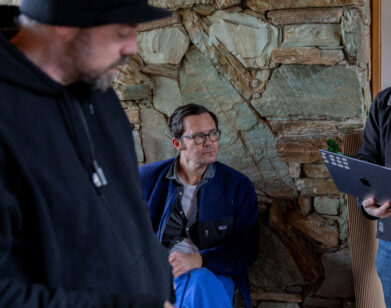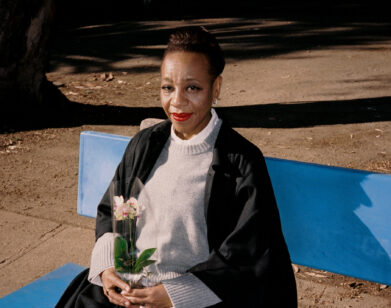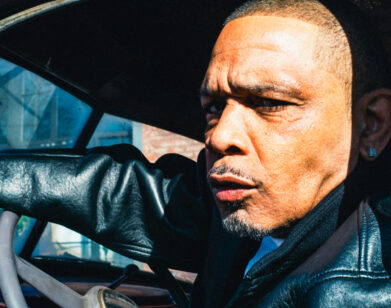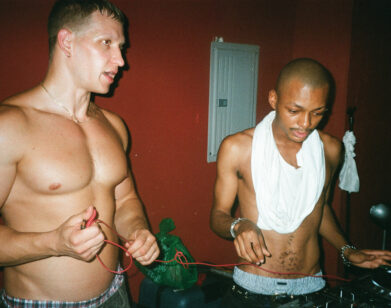IN CONVERSATION
Cleopatra Coleman and Debi Mazar on Scorpions, Sexuality, and Quitting Instagram
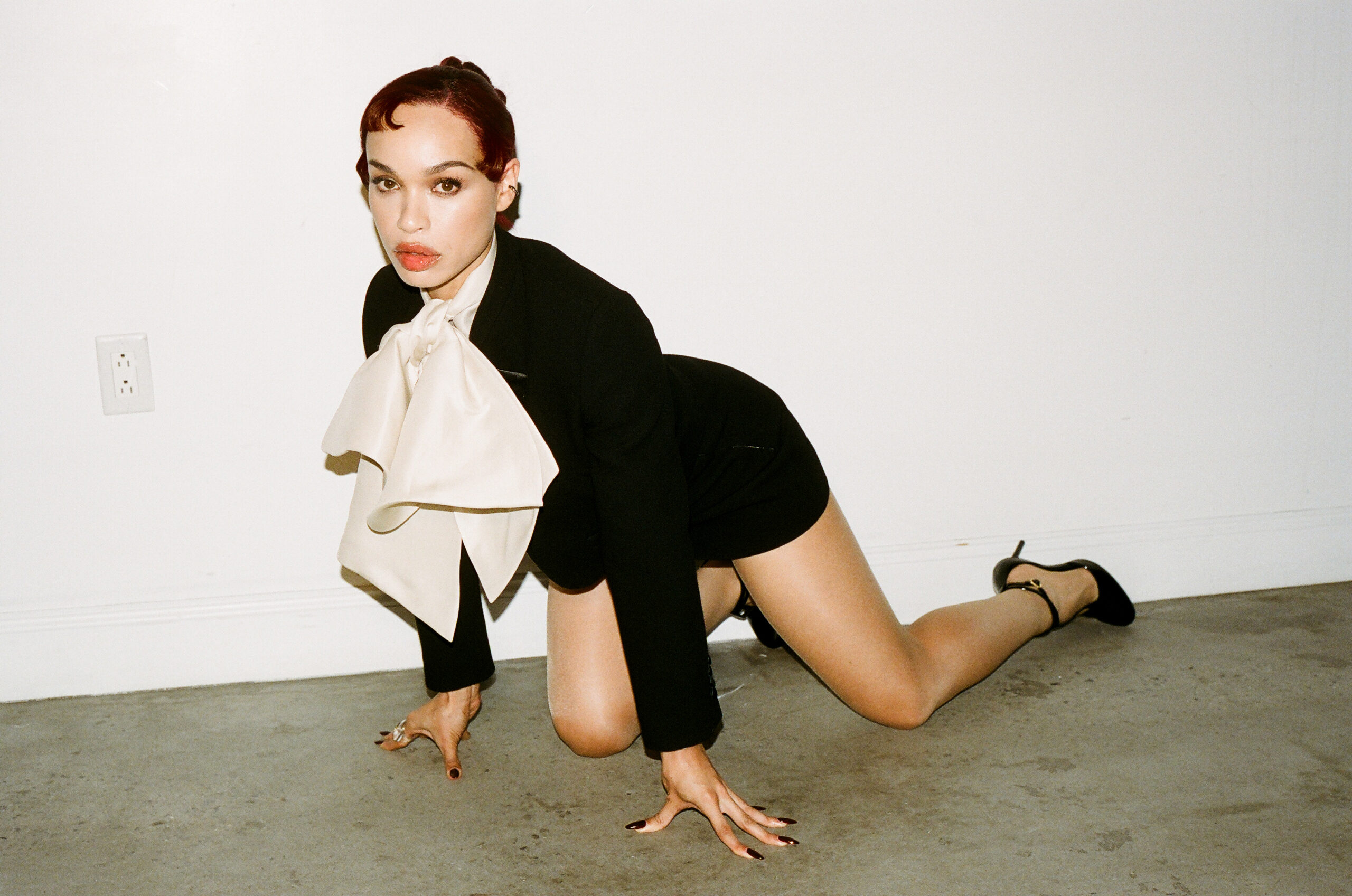
Cleopatra Coleman wears Jacket, Top, Skirt, and Ring Celine by Hedi Slimane. Shoes Ferragamo. Earrings Marina Moscone.
It’s been a little over ten years since a woman named V. Stiviano detonated the NBA world by leaking a bombshell tape recording of Los Angeles Clippers owner Donald Sterling, who she worked for at the time, asking her not to associate with Black people in public. Overnight, Stiviano, an eccentric L.A. striver who saw herself as a Kim Kardashian-in-waiting, found herself at the center of a nationwide scandal that led to the sale of the Clippers and reopened the racial and class wounds at the heart of American society. That story is being retold in the FX limited series Clipped. In real life, Stiviano was something of a cipher, masking her face with a dark visor and making bizarre appearances on her front lawn and an ABC news interview with Barbara Walters. But as played on the show by Cleopatra Coleman, she is imbued with nuance, texture, and even sympathy. For Coleman, an Australian actor who has been working consistently in Hollywood since she moved to L.A. with her own dreams of making it, the role was a chance to once again showcase the versatility she’s already shown in projects like Infinity Pool and The Last Man on Earth. To mark tonight’s finale, Coleman, who was in New York shooting the upcoming Netflix drama Black Rabbit, got on the line with her newish friend Debi Mazar to discuss their Italian getaway, humanizing a real person, rowdy Australians, scorpion encounters, and getting rid of social media.
———
DEBI MAZAR: Where are you?
CLEOPATRA COLEMAN: I’m in Brooklyn. I’m just here on a shoot for the next few months, but I love it so much, I don’t know if I’ll go back to L.A.
MAZAR: I grew up in Brooklyn. I raised my kids there. I’m in love with Brooklyn, but I did 20 years bicoastal. And I don’t know if you’re single or not, but—
COLEMAN: I am.
MAZAR: It’s great to go back and forth. The landscape of L.A. is fantastic.
COLEMAN: It is, and being Australian, I really need that. I feel crazy if I don’t get that dose of nature. You’re someone I look up to so much in so many ways, even your lifestyle. I’m like, “That’s exactly what I want to do.” You live in Florence. I remember when I met you at that party—
MAZAR: Do you know where we were? We were in the home of Beatrice. Beatrice was Dante’s lover, the love of his life, and that was the actual palazzo where she lived. We were there to see a Cuban orchestra, which was lovely. You don’t get a lot of that here in Florence. And I saw you in the room and you were so beautiful, and you were talking to people that I knew, so I said, “I wonder who that girl is.” And somehow we ended up trading numbers and we met the next day. I remember I said to you, “I have my electric Cinquecento parked around the corner. Come to my house and have a coffee. I want to show you my house in the hills.” I found you very mysterious and somewhat ethereal, but also I just liked that your name was Cleopatra. Who names her kid Cleopatra?
COLEMAN: It’s so funny because when I went to Rome, people said, “Oh, you have a very difficult name to come to Rome,” and I thought, “Are we not over this yet?” But when I saw you, I was like, “Oh my god, it’s actually her.” You were so beautiful. You had a red lip on and your hair tied back and you were with lovely Alessandro. You showed me those beautiful vintage stores, and I still have those clothes that we bought.
MAZAR: Have you worn them?
COLEMAN: I haven’t worn the red dress because I’m saving it for something special, but I’m wearing the suede two-piece. It’s kind of like a Kate Bush type thing. Do you remember it?
MAZAR: Yeah. Wasn’t it, like, ’70s suede or something?
COLEMAN: Yeah. Green. I wear that set and I think of you every time. I need to come back to Florence.
MAZAR: Florence is popping right now. There’s theaters opening. It’s just a little jewel box filled with culture. And as you know, you can just jump on the train and go anywhere in an hour. Tomorrow I’m going to Rome to shoot at Cinecitta [Studios]. I was in Sardinia. I went to Paris for 24 hours.
COLEMAN: I love your life.
MAZAR: Well, you’re a woman of adventure. Another reason that I was very attracted to you is because of your accent. I was like, “Wait a minute, you’re Australian, and I’m going to film in Australia very soon.” I had never been, and when I told you I was going to Adelaide, you were like, “Oh.” I understand why now, because it’s a real sleepy town.
COLEMAN: It’s sleepy.
MAZAR: Everything closes at five, but that’s good for me because I don’t have distractions. And the nature is mind-blowing. They have cockatoos and lorikeets and brown snakes and those redback spiders and all these crazy, crazy things. I went to the beach and it was one of the most gorgeous beaches I’ve ever seen, but my friend went in the water—he’s a surfer—and a Great White passed underneath him. Then he came out to go to his car and a brown snake lunged at him.
COLEMAN: You got to be careful in Australia.
MAZAR: Yeah, Australia’s wild. I’m not feeling those marsupials with their tails and all that.
COLEMAN: The marsupials are the only nice ones, Debi.
MAZAR: I know, but they just freaked me out because they remind me of rats. They’re exactly the same as a New York subway rat. They’re like, this big, with the tail.
COLEMAN: Hot take.
MAZAR: I’m not down. But you guys are salt of the earth, and I didn’t realize because a lot of times Australians come to New York and they’re rowdy and they get their drink on. But when I was there, they’re so tough that the women are not afraid of bugs, and the guys are really jovial. In fact, my series, Ladies in Black, premieres today in Australia on ABC.
COLEMAN: Oh, congrats.
MAZAR: Thanks. Let’s talk about this show. You’re playing V. Stiviano. Are you Italian?
COLEMAN: [Laughs] She’s not Italian.

Jacket McQueen by Seán McGirr. Earrings Verdura. Tights Wolford.
MAZAR: I’m half joking, but whoa, your character. I can’t wait to watch the rest of the episodes because your character is going somewhere. I don’t want to give too much away for people that haven’t seen it, but you’re savvy, smart, and a hustler. You’re highly unlikable in moments, and I’m like, “What a bitch.”
COLEMAN: But then…
MAZAR: You’re fighting for your kid. You’re fighting for your survival. I don’t like that whole sports world. Sure, I’ll go to a Lakers game or the Knicks or something, but it’s so intense. People always ask me, “What made you take this role?” And I’m like, “The check. What do you think?” But I’m at an age now where even though I might need the check, I don’t take jobs that don’t enhance my life. There’s not a challenge there. But you are somebody who is very strong about what choices you make in your life.
COLEMAN: Yeah, I am.
MAZAR: And you’re young enough that you can say no to certain things just because you have so much in front of you. Tell me about your character. Did you meet her?
COLEMAN: No I’ve never played a real person before, and that can be very intimidating. She’s this iconic bad girl, and I wanted to look at her as a character. That was the only way that I could do the job, so I didn’t meet her. I don’t know how she feels about it, but I do hope that she likes it because we humanize her a lot. If this scandal happened today, people would immediately be like, “Icon.” Whereas 10 years ago, the way the media framed her was very one-dimensional, and Gina Welch, the writer, did such a good job of seeing her as a human being. It’s not about saying she’s never done any wrong. Her humanity is her humanity. It’s the light and the dark. And you understand that immediately, having played iconic bad girls.
MAZAR: What sign are you, by the way?
COLEMAN: I’m a Scorpio. Do you have any Scorpio in your chart?
MAZAR: Yes, I do. I’m Leo with a Scorpio Rising.
COLEMAN: I knew it. You have those Scorpio eyes.
MAZAR: Oh, I like that. There was a scorpion on the dashboard of my car the other day. I was like, “Ew, what’s that thing?” I swiped it off and it fell out the door, and then all of a sudden the lobster claws opened and it was a little scorpion.
COLEMAN: Oh my gosh, I didn’t know you had those.
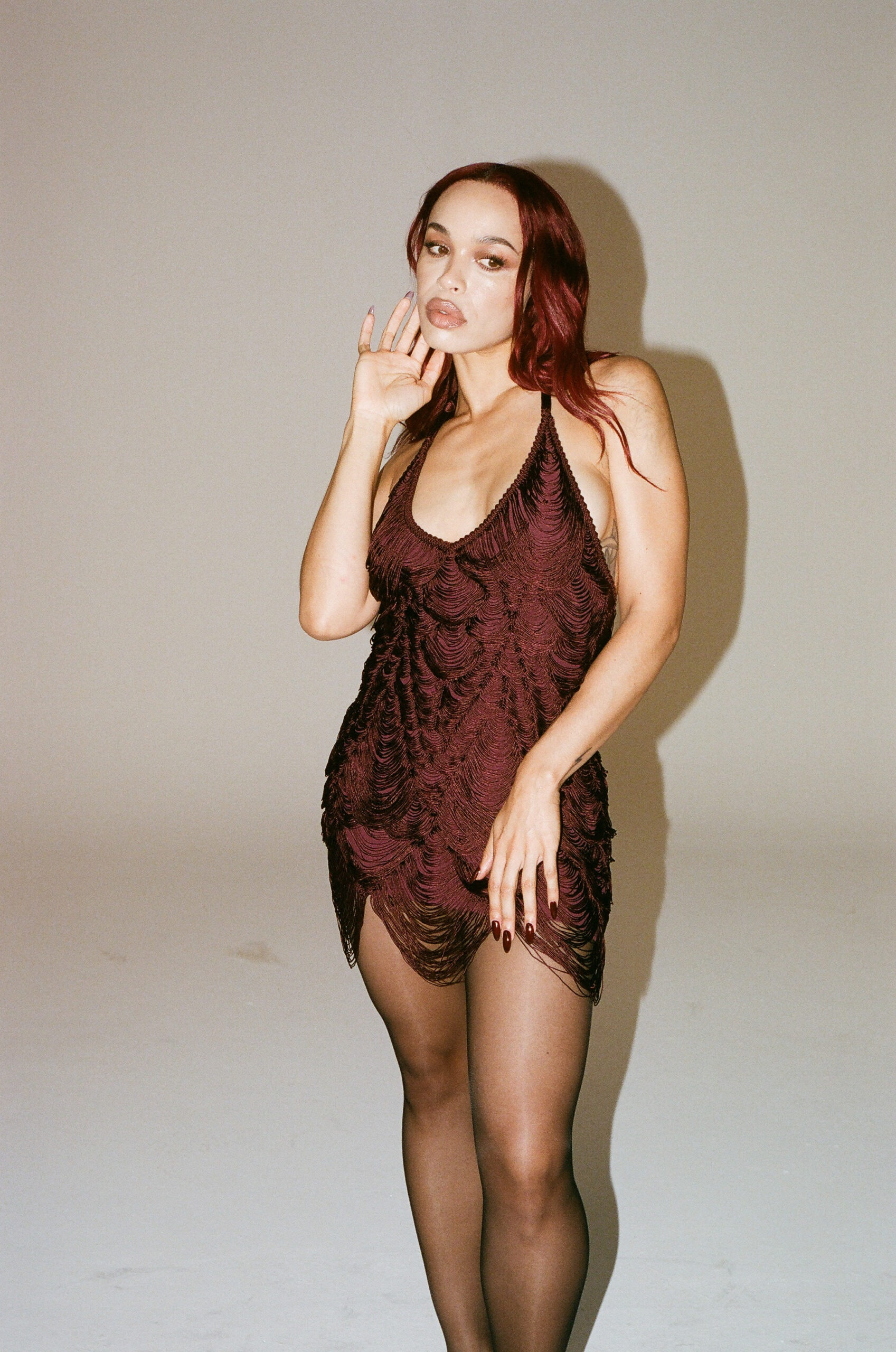
Dress Ferragamo. Tights Wolford.
MAZAR: Me neither. And then I had a huge snake climbing around my portico the other day. I think they’re coming to me now because I’m playing Medusa soon.
COLEMAN: I remember you mentioning that.
MAZAR: How does it feel to play a mother?
COLEMAN: Well, these are foster children, so she didn’t give birth to them or raise them for a very long time. When we meet her, she hadn’t had them for that long.
MAZAR: Oh, okay.
COLEMAN: I don’t really know a lot about her personal feelings about her children because obviously she’s kept that quite private, which makes sense. I think a lot of her behavior is motivated by survival, and her kids are obviously a part of that. This woman is a survivor. She came from poverty and was an entrepreneur running food trucks and built her way up through the hierarchies of L.A. And in her mind, the top of that is Kim Kardashian. That’s where she wants to be. This was when people were getting famous from releasing tapes. When the tape comes out, everyone assumes it’s a sex tape. Of course, it’s not a sex tape, it’s a recording of a racist rant from Donald Sterling. But essentially, I think the idea was to get the same sort of result. The early days of Instagram was such an interesting time for viral scandals, the way that regular people would suddenly become famous.
MAZAR: I loved how you did your accent and you didn’t slip. I hear Nicole Kidman slip all the time. Maybe her accent’s heavier than yours. Did you base it off of somebody?

Jacket, Top, Skirt, and Ring Celine by Hedi Slimane. Earrings Marina Moscone.
COLEMAN: Well, I based it off of her, because thankfully, playing a real person from a 10-year-old scandal, there’s interviews. She did this famous Barbara Walters interview. She did Entertainment Tonight, and of course, she’s on the tape as well. Ed O’Neil and I recreated the actual recording word for word, which was really tough. We did that on day one, so we really got to know each other while struggling through the scene. But I based my accent off her accent, which is kind of an exaggerated vocal fry.
MAZAR: It had a very L.A. feeling to it. But it was interesting to see your character have to go through being biracial and dating a horrible racist just for money, and then him saying, “Oh, don’t hang out with African Americans,” and she’s clearly half African American. And in the car with your girlfriend who is African American, you’re like, “I’m not Black.”
COLEMAN: Absolutely. I cannot speak for her, but I can speak to the character, which is based on the myth of her. As a biracial person, it’s usually about how other people perceive you, and I think she’s wanting to align with whatever behooves her the most. Sometimes she’ll identify one way, sometimes she’ll identify another way in the show. It’s a really, really rich subject matter that I find interesting to play with as a biracial person who grew up in Australia. Obviously, anyone I play is going to be biracial because I am, but not all characters are about that, so it’s interesting to expand on that.
MAZAR: Yeah. That is amazing. And that Jacki Weaver, I’m living for her performance. You must’ve had so much fun doing scenes with her.
COLEMAN: I love her. She’s Australian, too. That accent she’s doing is so much like the real Shelly Sterling. She would drink half and half to get sort of mucusy.
MAZAR: Oh god.
COLEMAN: She’s an incredible actress. Jacki Weaver is an icon back home in Australia. She’s tiny. She’s quite soft spoken, but she’s a powerful performer. She really gave it back to me in a way that was indicative of how safe we felt as two Aussies.
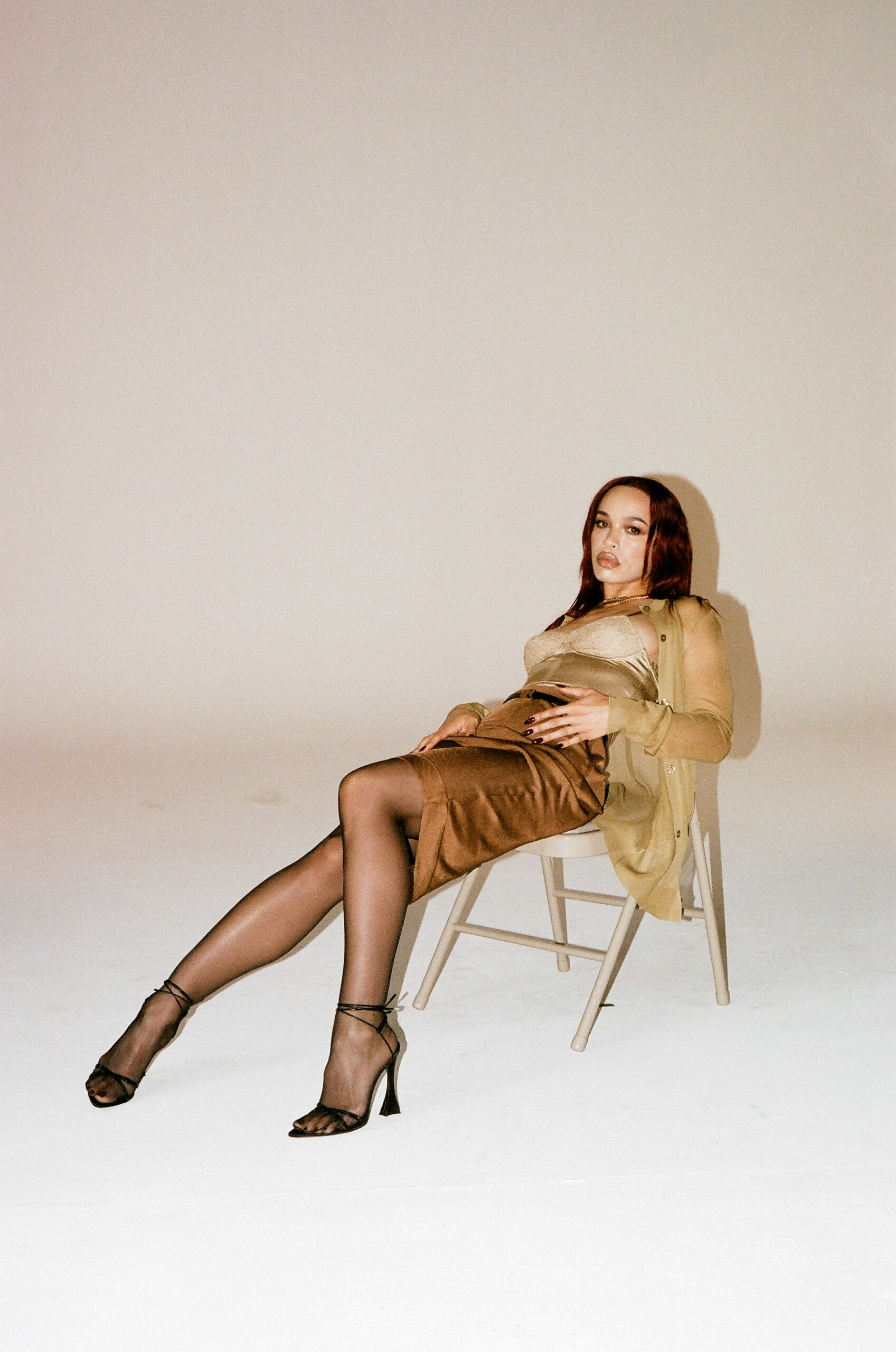
Cardigan, Top, Skirt, Belt, and Shoes Saint Laurent by Anthony Vacarello. Necklace Bevza. Tights Wolford.
MAZAR: I remember we were talking at my table outside and you were saying to me that you’re extremely private as a person. You were kind of hinting around about a situation and I could not get it out of you. I don’t think you do much social media either.
COLEMAN: I don’t have social media anymore.
MAZAR: Why?
COLEMAN: I found it difficult to boil myself down into being a certain thing. I found no matter what I would post, people would just say, “Them lips though,” or they would be sexualizing me all day long. I’m happy to share my sexuality, but that’s not the only thing about me. I’d post a trailer for a movie that I’m in that I worked so hard on and the algorithm wouldn’t even show it to people. So I’m like, “Why the fuck am I here?” I’d rather be mysterious and let people see me through the projects that I’m in. Actually, it was Laurence Fishburne who I was talking to about it while we were filming. I still had socials and I was complaining about it a bit, and he’s like, “Well, why are you on it?” And I said, “Because it’s part of the job,” and he said, “No, no, no, it’s not part of the job. It’s part of the culture, and there’s a difference.” I was like, “Oh my god, you’re right.”
MAZAR: It’s like, the king has spoken.
COLEMAN: Exactly.
MAZAR: It’s funny because I remember him back in the day when he was younger and he always had an intense presence. He was a bit more playful back in the day, and now he’s like, the man. I find him so sexy.
COLEMAN: So do I.
MAZAR: And such a great talent. What do you have coming up next?
COLEMAN: Well, I’m filming the show Black Rabbit, which is a miniseries for Netflix with Jason Bateman and Jude Law and an amazing cast.
MAZAR: Wonderful. And you’re an easy train away. Well, no, the subway is really sketchy right now.
COLEMAN: I’m not afraid of a subway. I come from Melbourne and Sydney, it’s all about public transport.
MAZAR: Well, in our profession, you have to protect your face. I remember I was shooting a Woody Allen movie a million years ago and I got in a fight with a cab driver. I was sitting in the back with a girlfriend of mine, it was raining, and this cab driver blew through two red lights going really fast on Greenwich Avenue. I’m like, “What the fuck?” We thought we were going to die. I’m like, “Stop the car. I want to get out.” And when I got out, he goes, “You pay me.” I’m like, “I’m not paying shit.” And he got out of the car and he put his hands up, and my girlfriend goes, “Debi, you’re shooting tomorrow. You can’t get a black eye.” I didn’t pay the guy, but we have to keep it together.
COLEMAN: Fuck that guy. Do you want to meet George? My dog.
MAZAR: I do. Hi, George.
COLEMAN: Say hi, Auntie Debi. He comes with me everywhere.
MAZAR: Not to work though, right?
COLEMAN: Every location. He comes to the trailer with me. The ADs will come by and take him for little strolls. He’s like an emotional support dog.
MAZAR: I’m so happy you have him with you. I can’t travel with my dogs because they’re huge. I have a Rhodesian Ridgeback and a few other breeds. And I don’t have my children or my husband, so I end up buying plants and talking to them. I moisturize their leaves, I dust them, and they become my babies.
COLEMAN: This is off topic, but there was this Japanese scientist, Dr. Emoto, and he did these water experiments where he would take vials of water, say positive things to one and negative things to the other, freeze them, and see what the particles looked like. The positive ones froze in perfect symmetrical snowflakes, the negative ones froze all asymmetrical.
MAZAR: That’s really interesting.
COLEMAN: And when you think about how much water we are, the things that we say to ourselves, the things we say to plants, it actually affects our molecules. I like to think about that a lot. That’s why affirmations work. The words you say matter.
MAZAR: You have to keep your spirit happy. And it reflects in your work.
COLEMAN: You get that, and I knew that the moment I met you. You have that soulful, spiritual side. You also don’t take shit, and I think it’s so important to have both, and that’s why I admire you so much.
MAZAR: I think we were meant to meet.
COLEMAN: Me too.
MAZAR: I think the universe brought us together. I don’t just talk to somebody half my age. Well, actually, I talk to everybody, but I don’t often talk to people, exchange a number and then have them come over to my home the next day.
COLEMAN: I know.
MAZAR: I’m very excited to see your path. I didn’t know your work before I met you and you basically let me know that you were going to be a huge star. Not in those words, but you just felt determined.
COLEMAN: Yeah, I’ve always known. It’s not about being a star in terms of celebrity. It’s always about the work. I enjoy it so much. I’ve known it since I was four, and it’s taken 20 years for the world to catch up to what I could see for myself, so it’s a really satisfying time that I’m trying to soak in. I don’t know how to soak it in other than to just say thank you.

Jacket, Pants, and Belt Schiaparelli. Earrings Marina Moscone.

Dress and shoes Ferragamo. Tights Wolford.
Hair: Ledora
Makeup: Ernest Robinson at OPUS Beauty
Nails: Nori using Chanel Le Vernis at See Management
Movement Direction: Jorge Dorsinville at Exposure NY
Photography Assistant: Andrew Espinal
Fashion Assistant: Macarena Cubino
Production Assistant: Kiernan Francis
Location: 100 Sutton Studios


